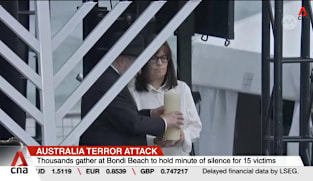Muhammad Faishal Ibrahim on misuse of drugs and constitution amendment bills
Singapore is refining its laws to keep pace with the evolving drug landscape and trends. It will change the approach towards controlling new psychoactive substances (NPS) and increase the punishment for possession of large quantities of selected controlled drugs. Minister of State for Home Affairs Muhammad Faishal Ibrahim outlined the key changes during the second reading of the Misuse of Drugs (Amendment) Bill and Constitution of the Republic of Singapore (Amendment) Bill in Parliament on Tuesday (Mar 21). The first key proposed change is a legislative framework to deal with NPS swiftly instead of playing catch-up. Dr Faishal pointed out that drug syndicates are able to quickly change the molecular structure of NPS and hence evade the law. He explained that under the current way of listing NPS, a person can only be prosecuted if found trafficking, manufacturing, importing, exporting or possessing them. Traffickers can easily overcome the laws by switching to new and unlisted NPS; drug suppliers are known to tailor the molecular structure of NPS according to what is not controlled through legislation. The proposed legislative framework will deal with NPS based on their capacity to produce a psychoactive effect rather than their molecular structure. Dr Faishal also highlighted the shifts towards dealing in larger quantities of drugs per transaction. He said the current punishments for possession offences are not differentiated by the type of drugs involved and are not tiered based on the quantity of the drugs. It does not sufficiently account for the greater harms, he said. Singapore needs a more deterrent sentencing regime, he added. The Ministry of Home Affairs is proposing to increase punishments, which will include caning for possession of selected controlled drugs above certain weight thresholds. For the lowest tier, it will be jail of up to 10 years or a fine of up to S$20.000. For the middle tier, the minimum mandatory sentence will be 10 years’ jail and five strokes of the cane, while the maximum is set at 20 years’ imprisonment and 10 strokes of the cane. For the highest tier, it will be at least 20 years’ jail and 10 strokes of the cane while the maximum is set at 30 years’ imprisonment and 15 strokes of the cane. Dr Faishal said the proposed amendments to the Misuse of Drugs Act will help Singapore stay ahead of the changing drug landscape.
Singapore is refining its laws to keep pace with the evolving drug landscape and trends. It will change the approach towards controlling new psychoactive substances (NPS) and increase the punishment for possession of large quantities of selected controlled drugs. Minister of State for Home Affairs Muhammad Faishal Ibrahim outlined the key changes during the second reading of the Misuse of Drugs (Amendment) Bill and Constitution of the Republic of Singapore (Amendment) Bill in Parliament on Tuesday (Mar 21). The first key proposed change is a legislative framework to deal with NPS swiftly instead of playing catch-up. Dr Faishal pointed out that drug syndicates are able to quickly change the molecular structure of NPS and hence evade the law. He explained that under the current way of listing NPS, a person can only be prosecuted if found trafficking, manufacturing, importing, exporting or possessing them. Traffickers can easily overcome the laws by switching to new and unlisted NPS; drug suppliers are known to tailor the molecular structure of NPS according to what is not controlled through legislation. The proposed legislative framework will deal with NPS based on their capacity to produce a psychoactive effect rather than their molecular structure. Dr Faishal also highlighted the shifts towards dealing in larger quantities of drugs per transaction. He said the current punishments for possession offences are not differentiated by the type of drugs involved and are not tiered based on the quantity of the drugs. It does not sufficiently account for the greater harms, he said. Singapore needs a more deterrent sentencing regime, he added. The Ministry of Home Affairs is proposing to increase punishments, which will include caning for possession of selected controlled drugs above certain weight thresholds. For the lowest tier, it will be jail of up to 10 years or a fine of up to S$20.000. For the middle tier, the minimum mandatory sentence will be 10 years’ jail and five strokes of the cane, while the maximum is set at 20 years’ imprisonment and 10 strokes of the cane. For the highest tier, it will be at least 20 years’ jail and 10 strokes of the cane while the maximum is set at 30 years’ imprisonment and 15 strokes of the cane. Dr Faishal said the proposed amendments to the Misuse of Drugs Act will help Singapore stay ahead of the changing drug landscape.



















